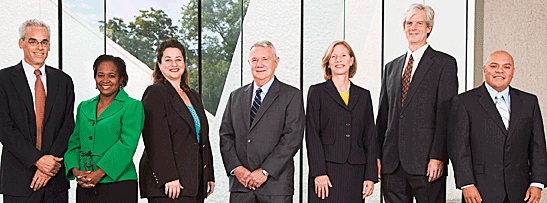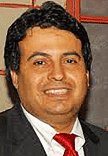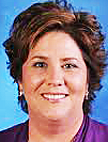Top Stories
Democrats sweep TCAD board election
Profile: Doug Greco for mayor
Latest articles
2009 Austin City Council E-mails
Private Deliberations and Political Maneuvering
More than 2,400 Pages of 2009 E-mails
Published Here in a Searchable Format
© The Austin Bulldog 2011


 The schisms within the Austin City Council that surfaced during the runoff election between incumbent Council Member Randi Shade and challenger Kathie Tovo were a revelation, as the other incumbents split evenly in lining up to support Shade or Tovo.
The schisms within the Austin City Council that surfaced during the runoff election between incumbent Council Member Randi Shade and challenger Kathie Tovo were a revelation, as the other incumbents split evenly in lining up to support Shade or Tovo.
Such passionate and public election advocacy among sitting council members is rare, if not unprecedented. The election outcome created deep political wounds in need of healing, not only for personal relations among council members but also for making good public policy when the council’s summer hiatus is over in three weeks.
The thousands of e-mails written in 2010 and January 2011 obtained through open records requests and The Austin Bulldog’s lawsuit, published May 12, foreshadowed some of the differences that surfaced in this runoff election. But the e-mails exchanged by council members in 2009, published here, show the roots of dissent among council members goes back much further.
The latest batch of more than 2,400 e-mails obtained through an open records request raise new issues—not only for what these e-mails reveal, but also because of what was withheld.
Some of these records show council members communicated among themselves about city business in numbers equaling or exceeding a quorum, a possible violation of the Texas Open Meetings Act.
Some of the council members also deliberated through their private e-mail accounts about a $250 million city project that was under consideration.
As for what was withheld, two (not four, as first reported) council members failed to provide copies of e-mails about city business conducted on their personal e-mail accounts during calendar year 2009: Sheryl Cole and Mike Martinez. (Deleted Chris Riley and Randi Shade.)
To withhold private e-mails about city business flies in the face of at least four open records opinions issued by the Texas Attorney General, which state that e-mails about government business that were created or received on personal accounts are public records (OR2003-0951, OR2003-1890, OR2005-01126, OR2005-06753) and thus are subject to release under the Texas Public Information Act.
As reported March 2, The Austin Bulldog filed a lawsuit against the mayor, council members, and City of Austin because of the failure to release copies of personal e-mails about city business exchanged by the city council during calendar year 2010 and January 2011. As a result, the mayor and council members eventually relented and released at least some of those e-mails.
For e-mails sent or received in 2009, Mayor Lee Leffingwell and Council Members Laura Morrison, Chris Riley, and Randi Shade released personal e-mails about city business and Council Member Bill Spelman released city business e-mails from his University of Texas account. As in the earlier releases forced by the lawsuit, the city characterized these actions as being voluntary. (Update July 7, 2011: Click here to see the cover letter provided by the City of Austin that accompanied the 2009 e-mails released by the city.)
The bottom line is the other city council members continue to take the position that they need not turn over e-mails about city business conducted on personal accounts. This position is inconsistent with the e-mail policy the city council adopted in an April 7 resolution that applies going forward. (See The Austin Bulldog report of April 15.)
Open Government Fixes Costing Big Bucks
So Far and No End in Sight
The Austin City Council so far has authorized spending $399,000 to hire outside attorneys to provide advice to bring the city into compliance with the Texas Open Meetings Act and to defend a lawsuit filed by The Austin Bulldog under the Texas Public Information Act.
More than half that amount has been spent already, most of it to deal with the ongoing investigation of possible criminal violations of the Texas Open Meetings Act by Travis County District Attorney David Escamilla.
Section 551.143 of the Texas Open Meetings Act states that a member or group of members of a governmental body commits an offense if the member or group of members knowingly conspire to circumvent this chapter by meeting in numbers less than a quorum for the purpose of secret deliberations in violation of this chapter. An offense, if proven, is punishable by a fine of $100 to $500 and confinement in the county jail for one to six months, or both the fine and confinement.
 The Austin City Council’s possible violations of Section 551.143 were exposed by The Austin Bulldog’s investigative report published January 25. That same day The Austin Bulldog reported that Escamilla was investigating these matters. That investigation is still ongoing.
The Austin City Council’s possible violations of Section 551.143 were exposed by The Austin Bulldog’s investigative report published January 25. That same day The Austin Bulldog reported that Escamilla was investigating these matters. That investigation is still ongoing.
The city’s response to these reports was swift. On January 28, the city council hired three law firms and huddled with their lawyers for two and a half hours in a closed-door executive session.
The practice of scheduled private meetings was immediately stopped. The Austin City Council held its first public work session February 9.
The investigative report exposed the longstanding practice of the mayor and council members holding a flurry of routinely scheduled private meetings that for many years had been taking place a day or two before every council meeting. These private meetings denied public access to significant deliberations about city business that are required to be conducted in the sunshine of open meetings.
The Austin Bulldog reported February 7 that the City of Austin committed $159,000 to engage three law firms to provide legal advice related to Texas Open Meetings Act: James E. “Jim” Cousar of Thompson & Knight LLP, C. Robert “Bob” Heath of Bickerstaff Heath Delgado Acosta LLP, and Randy T. Leavitt of the Law Office of Randy T. Leavitt.
Since then, City Attorney Karen Kennard has issued amendments that allowed other lawyers and support personnel within the three law firms to assist, and increased the total authorized expenditures to $289,000 solely to address Texas Open Meetings Act issues.
State Comptroller Sued over Formula One
From Paying Tax Funds to Formula One Promoters
Lawsuit Questions Whether Formula One
Qualifies for Subsidies Under State Law
by Ken Martin
© The Austin Bulldog 2011
Three Austin taxpayers filed a lawsuit today to stop State Comptroller Susan Combs from paying state tax money to the promoters of Formula One racing in Austin.
The lawsuit filed in state district court may affect the Austin City Council's action scheduled for tomorrow to enact ordinances that would otherwise enable the comptroller to make the payments.
Race promoters have publicly stated that the comptroller’s payment must be made in July for the race to take place.
Combs jumped on the opportunity for the race before consulting with the City of Austin or Travis County. In fact, Combs issued a letter to Formula One World Championships Limited on May 10, 2010, to certify that, “With the understanding that the first Formula 1 United States Grand Prix will be held in Texas in 2012, full funding of the entire sanction (fee) for 2012 will be paid to Formula One World Championship Limited (FOWC) no later than July 31, 2011. In subsequent years, two through 10, of the race promotion contract, i.e., 2013 through 2021, we will be sending $25 million to FOWC by the end of July 31 of each year preceding the actual race event.”
As a result of the comptroller’s early commitment, and the extreme lateness in approaching the City of Austin to sign on as the sponsoring municipality, the city is under the gun to approve contracts and is scheduled to consider doing so at tomorrow’s council meeting. The economic study that projects tax revenue to be derived from the race was not delivered until late Monday.
Lawsuit seeks to halt payments
Austin American-Statesman Pruning Payroll
Voluntary Job Buyouts Offered to 167 Employees
by Ken Martin
© The Austin Bulldog
The ever shrinking monopoly daily newspaper that serves Austin and Central Texas is once again reducing its workforce. While the final results won’t be final for a week, some 40 or more employees in the newsroom were among those who got early buyout offers and could be leaving.
This cutback comes more than two years after the Austin American-Statesman offered a voluntary retirement program to 130 employees in January 2009. At that time the Statesman employed 906 full-time and part-time workers. A dozen people in the editorial department took that offer—including Pulitzer Prize winning cartoonist Ben Sargent and journalists with up to 44 years of experience. That loss was sorely lamented by Editor Fred Zipp in a March 15, 2009 column, which indicated 71 people retired from the company.
This latest reduction in force would leave the paper with about 700 employees, a drawdown of about 22 percent since 2009, and a reduction of about five percent from the current workforce of 740. Zipp told The Austin Bulldog that employees who got the offers had until 5pm today to apply and the company has a week to review the applications. The company has reserved the right to limit departures in areas thought to be critical, he said.
Zipp told The Austin Bulldog that employees who got the offers had until 5pm today to apply and the company has a week to review the applications. The company has reserved the right to limit departures in areas thought to be critical, he said.
“It's not the huge talent exodus that I had feared,” Zipp said. “I hate to lose anybody and we are losing some good people here,” he added. “It’s regrettable but necessary as we find the right size while the business stabilizes.”
The latest announcement was buried in the bottom left corner of the June 2, 2011 business page.  Jane Williams—who took the job as Statesman publisher in January—said in that article the voluntary separation program offers up to a year’s severance pay for employees at or near retirement age. Williams said the Statesman is making the offers to reduce costs at a time revenues are drifting lower.
Jane Williams—who took the job as Statesman publisher in January—said in that article the voluntary separation program offers up to a year’s severance pay for employees at or near retirement age. Williams said the Statesman is making the offers to reduce costs at a time revenues are drifting lower.
Employees may retire at age 55, Chief Financial Officer Eddie Burns told The Austin Bulldog. Burns predicted about 20 percent would take the offer, and said the results “are pretty close to that number, based on the feedback I'm getting.”
Burns said about 25 percent of the early buyout offers went to employees in the newsroom, which makes up about the same percentage of the newspaper’s workforce.
The early buyout offer is apparently being applied throughout the Cox-owned local newspapers, including the 10 community newspapers. Editor Ed Allen of the Westlake Picayune said he received the offer, too, but does not intend to take it.
‘Austin American-Statesman’ Cutting Staff Again
Investigative Reports
For more than a decade the Bulldog has published hard-hitting, in-depth investigative reports that have shaped civic discourse and public policy, resulted in criminal prosecutions, and enlightened voters about candidates' records. Here are a few samples of our work:
About us
The Austin Bulldog is the premiere investigative journalism outfit in Central Texas. Established in 2009, the Bulldog has become a trusted independent voice for government accountability, known for its incisive, in-depth coverage of local elections and local governments.
Newsletter
Keep up with the best investigative reporting in Austin.
Follow us
Bulldog Team
Ken Martin
Founder and EditorOur critical accountability journalism wouldn't be possible without the generous donations of hundreds of Austinites. Join them and become a supporter today!
Areas of Coverage
Austin City Manager: Dallas discard vs Austin retread
Lame duck council set to vote on 20-year sweetheart tax deal for developer
Environmentalists assail plan for lakeside high rises
Urbanists vie to replace council member Kathie Tovo
First-ever opportunity to elect appraisal board members
Announcing the Government Accountability Project
Central Health launches search for new CEO
First-ever opportunity to elect appraisal board members
Project Connect
Lawmakers weigh axing Project Connect’s ‘blank check’ loophole
Project Connect scope drastically scaled back
Austin Transit Partnership gears up for key decisions on light rail design
Become a Bulldog supporter
The Bulldog is funded by its readers. We're not affiliated with any political party or interest group. We're not paid by corporate sponsors. Support us today so we can continue to be a trusted voice for government accountability.
Newsletter
Keep up with the best investigative reporting in Austin.
© The Austin Bulldog. All rights reserved.
2028 E. Ben White Blvd. #240-6115 Austin TX 78741







